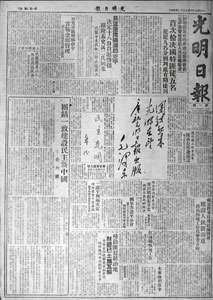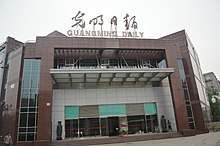Guangming Daily
The Guangming Daily, Guangming Ribao, or Enlightenment Daily[1] is a national Chinese-language daily newspaper published in the People's Republic of China. It was established in 1949 as the official paper of the China Democratic League. As one of China's "big three" newspapers during the Cultural Revolution, it played an important role in the political struggle between Hua Guofeng and the Gang of Four in 1976 and between Hua and Deng Xiaoping in 1978.
 | |
 Front page of the first issue on 16 June 1949 | |
| Type | Daily newspaper |
|---|---|
| Format | Broadsheet |
| Founded | 16 June 1949 |
| Political alignment | Communist Party of China |
| Language | Chinese |
| Headquarters | Beijing |
| Circulation | 490,000 |
| Website | www |
| Guangming Daily | |||||||||
|---|---|---|---|---|---|---|---|---|---|
| Simplified Chinese | 光明日报 | ||||||||
| Traditional Chinese | 光明日報 | ||||||||
| |||||||||

History
The Guangming Daily, then romanized as Kuangming, was launched on 16 June 1949 in Beijing. It was originally the official newspaper of the China Democratic League, but later became the Chinese Communist Party's official organ for China's educated elite.[2]
During the Cultural Revolution (1966–1976), Guangming Daily was one of the only three national newspapers that remained in circulation, together with the People's Daily and the People's Liberation Army Daily, and the sole magazine Red Flag. The four periodicals, known as "the three papers and one magazine", dominated China's public affairs. For safety reasons, regional newspapers and specialist magazines all took cues from the big four, and largely reprinted articles from them.[3]
Before the death of Mao Zedong, the paper fell under the control of the radical Gang of Four led by Mao's wife Jiang Qing. In October 1976, Vice Premier Ji Dengkui played a significant role in taking over the Guangming Daily, helping Mao's successor Hua Guofeng oust the Gang of Four and put an end to the Cultural Revolution.[4]
In 1978, the liberal Communist Party leader Hu Yaobang appointed Yang Xiguang, formerly with Shanghai's Jiefang Daily, chief editor of the Guangming Daily. Under Yang's editorship, Guangming was the first Chinese newspaper to stop publishing Chairman Mao's Quotations on the front page every day.[5] On 11 May 1978, it published Hu Fuming's famous editorial "Practice is the Sole Criterion for Testing Truth" (Chinese: 实践是检验真理的唯一标准), refuting Hua Guofeng's Two Whatevers theory in support of Deng Xiaoping's Reform and Opening policy. The article was quickly reprinted in almost all major Chinese newspapers, cementing support for Deng's victory over Hua.[5][6]
Two Guangming Daily journalists, Xu Xinghu (许杏虎) and his wife Zhu Ying (朱颖), were killed on the night of 7 May 1999 in the United States bombing of the Chinese embassy in Belgrade during the NATO bombing of Yugoslavia.[7]
Circulation
Guangming Daily's circulation reached 1.5 million in 1987, but as independent publications flourished during the Reform and Opening era, it dropped to 800,000 in 1993.[2]:167 To survive in the market, it reduced political coverage and propaganda, and increased its coverage on culture and science.[2]:167 As of 2013, the paper had a daily circulation of 490,000.[8]
Guangming Online
In 1998, Guangming Daily launched its official website Guangming Online (GMW.cn), which was one of the earliest news websites in China.[9] As of July 2017, Alexa Internet ranks the website as the 73rd most visited in the world and 14th in China.[10]
The Beijing News
In 2003, Guangming Daily partnered with the Nanfang Media Group (publisher of the highly successful Southern Weekly) to jointly publish The Beijing News, which quickly became one of Beijing's most influential newspapers.[11]
References
- John King Fairbank; Denis Crispin Twitchett, eds. (1978). The Cambridge History of China: Volume 14. Cambridge University Press. p. 693. ISBN 978-0-521-24336-0.
- Zhao, Yuezhi (1998). Media, Market, and Democracy in China: Between the Party Line and the Bottom Line. University of Illinois Press. pp. 17–18. ISBN 978-0-252-06678-8.
- Cheek, Timothy (7 January 2016). The Intellectual in Modern Chinese History. Cambridge University Press. p. 183. ISBN 978-1-107-02141-9.
- Song, Yuwu (8 July 2013). Biographical Dictionary of the People's Republic of China. McFarland. pp. 148–. ISBN 978-0-7864-3582-1.
- 光明日报: 第一个取掉报眼上的毛主席语录 (in Chinese). Phoenix Media. 24 February 2010.
- Zeng, Tao. 关于真理标准问题的讨论. People's Daily (in Chinese). Retrieved 12 July 2017.
- Ponniah, Kevin; Marinkovic, Lazara (7 May 2019). "The night the US bombed Chinese embassy". BBC News. Retrieved 7 May 2019.
- "Main Media Players in China". AHK Greater China. Archived from the original on 1 November 2014. Retrieved 12 July 2017.
- "About GMW.cn". Guangming Online. 31 August 2012.
- "gmw.cn Traffic Statistics". Alexa Internet. Retrieved 12 July 2017.
- Jonathan Hassid (2016). "Beyond pushback". China's Unruly Journalists: How Committed Professionals are Changing the People's Republic. Routledge. p. 113. ISBN 978-1-315-66611-2.
External links
- Official website (in Chinese)
- Official website
